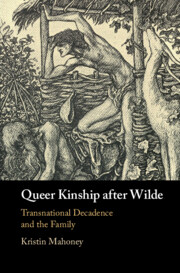Book contents
- Queer Kinship after Wilde
- Queer Kinship after Wilde
- Copyright page
- Contents
- Figures
- Acknowledgments
- Introduction
- Part I Queering Kinship/Kinship as Queer Politics
- Chapter 1 The Son of Oscar Wilde
- Chapter 2 “Out and Out from the Family to the Community”
- Part II Queer Retreat and Cosmopolitan Community
- Part III Decadent Modernism and Eroticized Kinship
- Notes
- References
- Index
Chapter 1 - The Son of Oscar Wilde
Cosmopolitanism and Textual Kinship
from Part I - Queering Kinship/Kinship as Queer Politics
Published online by Cambridge University Press: 15 September 2022
- Queer Kinship after Wilde
- Queer Kinship after Wilde
- Copyright page
- Contents
- Figures
- Acknowledgments
- Introduction
- Part I Queering Kinship/Kinship as Queer Politics
- Chapter 1 The Son of Oscar Wilde
- Chapter 2 “Out and Out from the Family to the Community”
- Part II Queer Retreat and Cosmopolitan Community
- Part III Decadent Modernism and Eroticized Kinship
- Notes
- References
- Index
Summary
Chapter One argues that Vyvyan Holland forged a textual relationship with his father Oscar Wilde while collaborating with early Wilde scholars in the editing of Wilde’s letters and extended his father’s practice of importing sexually dissident content from abroad while translating works by the French modernist Julien (or Julian) Green. Following Wilde’s trials, his sons were separated from their mother and from one another and shuttled between various boarding schools abroad, an experience Holland described as deeply traumatic and lonely. His existence was devastated by the effects of late-Victorian sexual legislation, which divided him from his family. But, when he came of age, he found community with a network of men who loved Wilde and loved books, locating himself amidst other forms of relationality and affection. This chapter asserts that Holland modeled his own cosmopolitan aesthetic on his father’s, remaining similarly detached from and skeptical of English moral sensibilities, and focuses on how the translation of queer modernist texts allowed him to obliquely continue his father’s queer cosmopolitan project. Holland was able to find his way back to his father through textual acts, acts of cosmopolitan collaboration and translation, and by generating an alternative familial bond with early Wilde scholars.
Keywords
- Type
- Chapter
- Information
- Queer Kinship after WildeTransnational Decadence and the Family, pp. 33 - 56Publisher: Cambridge University PressPrint publication year: 2022

